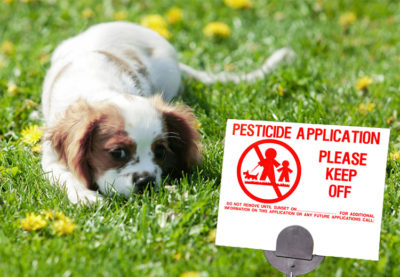Pesticides are arguably one of the gravest and most widespread problems with industrial society.
The relentless desire to control nature has led to countless innovations for killing the problems that stand in the way of achieving desired outcomes. We create antibiotics to kill the germs we believe are the sole cause of our illness, and we create pesticides to kill the creatures that undermine our perfect lawns and perfect yields.
But this small-mindedness is having dire consequences on the world that sustains us. Just as antibiotics are only leading to more illness (in the form of antibiotic-resistant superbugs), pesticides are creating greater and greater levels of systemic imbalance.
Pesticides are polluting and destroying ecosystems across the planet, leading to the mass extinction of honeybees (and endangering 75% of our food supply in the process), and raising the incidence of a dramatic number of diseases and conditions, including obesity, immune dysfunction, depression and other mood disorders, cancer, inflammatory bowel disease, ADHD, autism, Alzheimer’s disease, Parkinson’s disease, infertility and other reproductive issues, and more.[1]
Here’s another effect of toxic pesticides that’s often overlooked, though: they could be undermining the health of your pets.
Cats and dogs could be even more at risk
When we let our pets out to wander, it can be easy to forget how many dangers await them. If you (or your neighbors, for that matter) use pesticides on your lawn or garden, you should be especially worried. Many experts believe that cats and dogs may have an even lower toxicity threshold than humans with regard to pesticide exposure. This sensitivity could explain the skyrocketing rates of cancer incidence in pets.[2]
One study set out to explore the causes behind cancer and degenerative illness in pets, and found that over 75% of the animals tested had high levels of pesticides and other toxic chemicals in their bloodstream.[3]
Worryingly, even animals who purportedly don’t spend much time outside were nevertheless contaminated. Researchers posited that because of their heightened sensitivity, even picking up chemical traces from their owners’ clothing can be problematic.
Of course, pesticide manufacturers claim that reasonable usage of their product is completely safe, despite enormous evidence to the contrary. And given that these safety guidelines don’t even seem to be accurate for humans, they could be even more grossly inaccurate for animals. This is especially troubling because animals tend to maintain much closer and more prolonged contact with pesticide-treated areas (chances are your dog rolls around in the grass more than you do).
Be on the lookout for the following symptoms of pesticide toxicity in your pets, so that you can prevent more serious and potentially fatal health problems.
- Fever
- Vomiting
- Depression or extreme fatigue
- Anorexia or difficulty eating
- Hypersalivation
- Constricted pupils
- Increased heart rate
- Lack of coordination
- Respiratory problems
- Seizures or muscle tremors
- Diarrhea
How to protect your pet
Even if your pet isn’t exhibiting any of the symptoms presented above, it’s always a good idea to be proactive. Because pesticides and other toxins are endemic in our world (and exposure to them is inevitable), anything you can do to minimize their effect on your pet is helpful.
The least you can do is create a safe, toxin-free space within your own life and home. To whatever degree possible, stop using products that contain health-disrupting toxins.
Know that you can have a beautiful lawn and garden without the use of toxic pesticides. The disciplines of organic gardening, biodynamic gardening, and permaculture offer a wealth of practices for taking care of weeds and pests, while ensuring the long-term health of your garden and the living things that come into contact with it (including you and your family).
For starters, pay attention to the health of your soil. Excessive weed growth and insect infestation can be a sign of nutrient deficiency—applying nutrient-rich compost to your lawn and garden on a regular basis can be tremendously helpful.
Secondly, remember that not all weeds and critters need to be (nor should be) exterminated. Finding worms, bees, flies, and even some species of beetles and grasshoppers can be a sign that your garden is a tiny, thriving ecosystem. And some “weeds” are more desirable than you think—I recently looked up a weed that had sprouted up throughout my entire garden, only to find that it’s purslane, a delicious green (and pesto ingredient) that provides more healthy omega-3’s than any other plant source!
If there’s still weeds and pests that need to removed, there are plenty of perfectly harmless alternatives to poisonous pesticides. Remove weeds by hand, then sprinkle corn gluten pellets on your lawn to reduce new outbreaks of weeds by at least 60%.[4] Crushed egg shells will keep away snails and slugs, and milky spore will take care of Japanese beetle infestations.
You’ll still need to be wary of neighbors’ pesticide-treated yards, as well potentially contaminated water sources, but safeguarding your own lawn and garden is an excellent first step toward keeping your pet safe and healthy.
If you can endeavor to make the inside of your home toxin-free too (by tossing your toxic home care products, installing a high-quality air filter, and providing your pet with filtered water), both you and your pets will all have a much easier time preserving optimal health and longevity.
References
[1] http://www.greenmedinfo.com/blog/alert-certified-organic-food-grown-us-found-contaminated-glyphosate-herbicide?page=1
[2] http://www.cwhn.ca/en/node/39387
[3] http://www.healthy-holistic-living.com/pesticides-pet-health.html
[4] http://www.healthy-holistic-living.com/pesticides-pet-health.html






